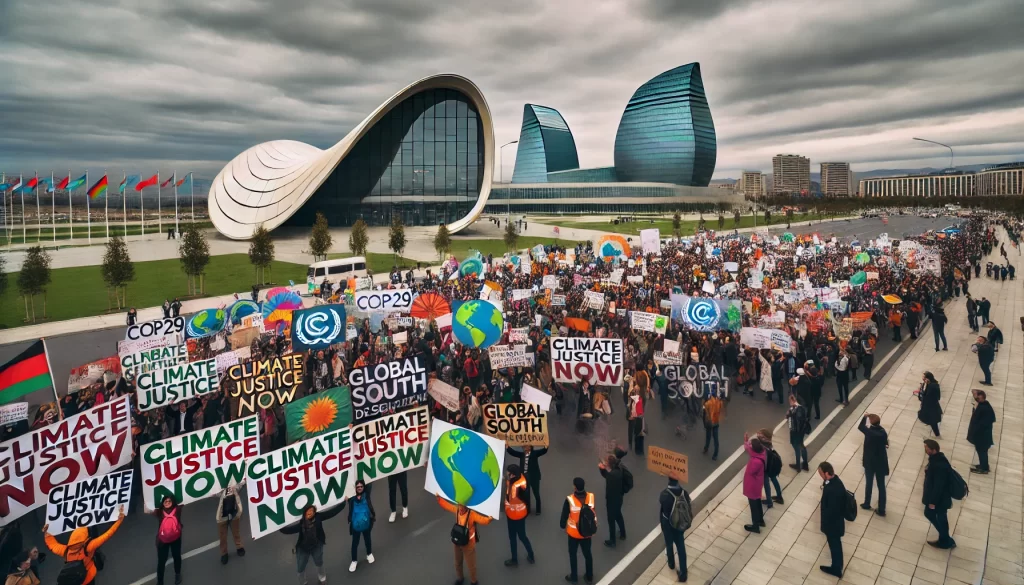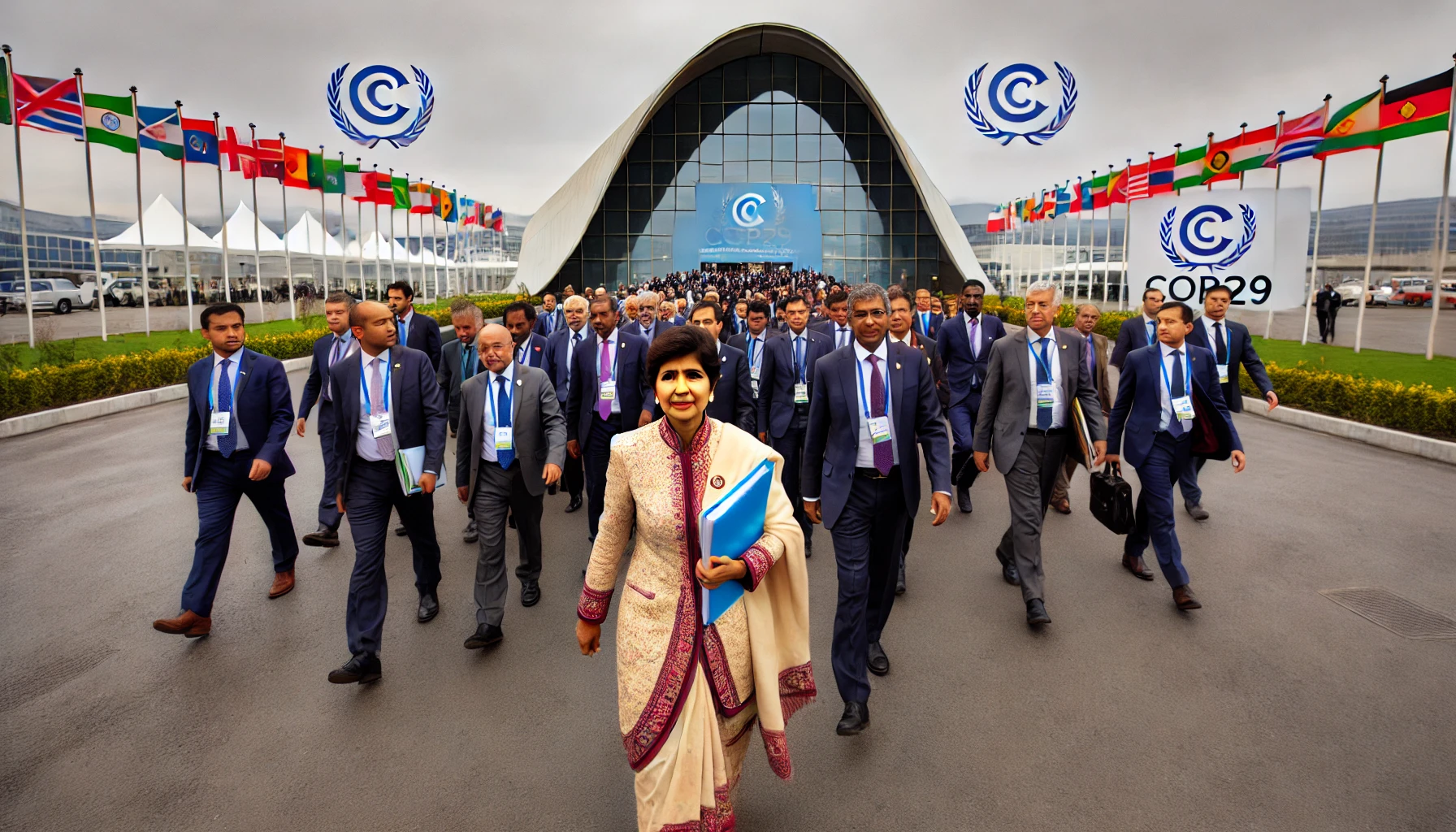The COP29 Climate Change Conference, held in Baku, Azerbaijan, concluded with the adoption of a controversial $300 billion annual climate finance deal. Developed nations committed to this financial package to aid poorer countries in combating climate change, but the agreement has been widely criticized by developing nations, activists, and nonprofit organizations as inadequate and unfair.
The Agreement: A Brief Overview
The deal aims to provide $300 billion per year by 2035, a significant increase from the previous $100 billion annual target set in 2020. This pledge includes contributions from public and private sources and sets a broader goal of raising $1.3 trillion annually to address climate change impacts. The funding is intended to help developing countries transition to renewable energy, decarbonize their economies, and adapt to the worsening effects of climate change, such as rising sea levels, extreme weather, and droughts.
However, the agreement does not offer concrete plans for implementation and relies heavily on loans rather than grants, sparking outrage among the intended recipients. Developing countries had originally demanded $1.3 trillion annually in unconditional grants, arguing that they bear the brunt of climate impacts despite contributing the least to global emissions.
Developing Nations’ Discontent
The dissatisfaction among developing nations was palpable. Chandni Raina, representing India, criticized the deal as “abysmally poor” and called the negotiation process a “travesty of justice.” She claimed the document was rushed through without proper consensus and labeled it an “optical illusion” that would fail to address the enormous challenges posed by climate change. Nigeria and Malawi echoed these sentiments, with Nigeria dismissing the deal as a “joke.”
Small island nations, represented by Vanuatu, expressed their disappointment, stating that the promised funding would never be enough to meet their needs. Vanuatu also announced plans to seek a legal opinion from the International Court of Justice to clarify countries’ obligations under international law to combat climate change.
The Least Developed Countries (LDC) bloc, representing 45 nations and over 1 billion people, condemned the deal for failing to allocate specific funds to particularly vulnerable nations. They criticized the agreement as eroding trust in global climate negotiations.
Backroom Deals and Procedural Concerns
The negotiation process itself came under heavy scrutiny. Reports surfaced of last-minute backroom deals involving major powers like the United States and Saudi Arabia. Draft documents were allegedly shared selectively, bypassing the established consensus-building process. Many delegations, including representatives from small island states, walked out in frustration, claiming their concerns were ignored.
Critics argue that the rushed adoption of the deal sets a dangerous precedent. Activists and negotiators highlighted how the negotiation process favored developed countries while sidelining the voices of vulnerable nations.

Activists and Nonprofits Respond
Global nonprofits and activists were equally vocal in their criticism. The Climate Action Network (CAN), which represents 1,900 organizations across 130 countries, described the outcome as a “betrayal” of the Global South. Tasneem Essop, CAN’s executive director, accused developed nations of acting in bad faith and failing to fulfill their promises.
ActionAid International pointed out that the financial package relies heavily on loans, which could increase the debt burden of already struggling economies. Teresa Anderson, a spokesperson for the organization, dismissed the agreement as “not worth the paper it’s written on.”
Mohamed Adow, director of Power Shift Africa, described the deal as a “disaster” for developing nations, criticizing it for offering only promises of future funding without immediate support. Friends of the Earth International labeled the conference the “COP of false solutions,” condemning the reliance on debt-driven financing.
Global Implications
The COP29 deal exposes deep divisions between wealthy and developing nations. Wealthy countries argue that domestic economic pressures, including inflation and geopolitical conflicts like the war in Ukraine, limit their ability to commit to larger financial packages. On the other hand, developing nations emphasize the historical responsibility of industrialized nations, which have contributed the most to global emissions.
The agreement also highlights ongoing struggles to fulfill the Paris Agreement’s goal of limiting global warming to 1.5 degrees Celsius. The world is currently on track for 3.1 degrees of warming by the end of the century, raising concerns about catastrophic climate impacts.
A Controversial Presidency
The Azerbaijani presidency of COP29 faced multiple controversies. Allegations surfaced of collusion with oil-rich nations like Saudi Arabia to weaken the deal. These claims further undermined trust in the negotiation process. Activists have called for reforms in the way COP presidencies are chosen, demanding greater accountability and transparency.
Future Outlook
The deal sets the stage for next year’s COP30 summit in Brazil, where countries will be tasked with mapping out a comprehensive climate action plan for the next decade. However, the skepticism surrounding the COP29 outcomes raises concerns about the effectiveness of future negotiations.
Developing nations and nonprofit organizations are calling for immediate reforms to the COP process, emphasizing the need for greater equity and transparency. They continue to demand stronger commitments from wealthy countries, including unconditional grants and mechanisms to hold them accountable for their financial pledges.
This article is based on the following articles:

Background Information
What is Climate Change?
Climate change refers to long-term shifts in temperatures and weather patterns on Earth. While some changes occur naturally, human activities—especially the burning of fossil fuels like coal, oil, and gas—have dramatically increased greenhouse gas emissions. These gases trap heat in the atmosphere, leading to global warming.
Key effects of climate change include:
- Rising temperatures: This leads to hotter summers and record-breaking heatwaves.
- Melting ice caps: Polar ice and glaciers are melting, causing sea levels to rise.
- Extreme weather: Hurricanes, floods, droughts, and wildfires are becoming more frequent and severe.
- Impact on ecosystems: Animals and plants are struggling to adapt to rapidly changing environments.
Why is Climate Finance Important?
Developing nations are often the most vulnerable to climate change because they lack resources to adapt or recover from its effects. For example:
- Small island nations face rising sea levels that could submerge their land.
- Many African and Asian countries experience severe droughts or flooding that destroy crops and livelihoods.
- Heatwaves and storms in poorer regions cause more loss of life because of weaker infrastructure.
To address this, wealthier nations, which historically have contributed the most to greenhouse gas emissions, are expected to help fund climate adaptation and mitigation efforts in these vulnerable countries. This financial assistance is known as “climate finance.”
What is COP?
COP stands for Conference of the Parties, a yearly gathering of countries that have signed the United Nations Framework Convention on Climate Change (UNFCCC), an international treaty adopted in 1992. The goal of COP meetings is to negotiate and agree on ways to limit global warming and address climate impacts.
- Significant Agreements:
- The Paris Agreement (2015) is the most well-known COP outcome, where countries agreed to limit global warming to below 2°C (and ideally to 1.5°C) compared to pre-industrial levels.
- The agreement also emphasized financial support for developing nations to achieve these goals.
- How COP Works:
- Representatives from nearly 200 countries gather to negotiate climate solutions.
- Decisions are made by consensus, meaning all parties must agree.
Historical Emissions and Responsibility
Industrialized countries, like the United States, European nations, and Japan, have historically emitted the most greenhouse gases because of their early reliance on coal, oil, and gas during the Industrial Revolution. These countries are often referred to as the “Global North.”
Developing nations, or the “Global South,” argue that they should not bear the same financial burden because:
- They are less responsible for causing climate change.
- They are more vulnerable to its effects.
This is why financial support from the Global North to the Global South is a key topic at COP meetings.
Challenges in Climate Negotiations
- Disagreements on Funding: Wealthy countries often promise financial aid but sometimes fail to deliver on these commitments. For example, a pledge to provide $100 billion annually by 2020 was only fulfilled two years late, in 2022.
- Balancing Interests: Countries have different priorities. Some nations depend on fossil fuels for their economy, while others are focused on renewable energy. This makes reaching agreements difficult.
- Transparency Issues: Negotiations often involve backroom deals or rushed decisions, which can leave some nations feeling excluded or ignored.
The Role of Activists and Nonprofits
Activists, nonprofits, and environmental organizations play a critical role in climate negotiations by:
- Raising Awareness: They highlight the consequences of inaction on climate change.
- Advocating for Justice: Many groups, such as Greenpeace and Friends of the Earth, push for wealthier nations to take greater responsibility.
- Monitoring Progress: Activists often hold governments accountable for meeting their pledges.
The Significance of the 1.5°C Goal
The 1.5°C goal is a central target in global climate policy. Scientists warn that exceeding this limit will result in catastrophic effects, such as:
- Increased frequency of deadly heatwaves.
- More severe droughts and floods.
- Disruption of ecosystems, leading to widespread species extinction.
Current projections suggest the world is on track for a 3.1°C rise by the end of this century, making stronger action urgent.
Key Terms to Know
- Greenhouse Gases: Gases like carbon dioxide (CO₂), methane (CH₄), and nitrous oxide (N₂O) that trap heat in the atmosphere.
- Fossil Fuels: Energy sources like coal, oil, and natural gas that release greenhouse gases when burned.
- Renewable Energy: Clean energy sources, such as wind, solar, and hydro, that do not emit greenhouse gases.
- Adaptation: Adjusting to the effects of climate change (e.g., building sea walls to protect against rising sea levels).
- Mitigation: Reducing greenhouse gas emissions to prevent further global warming.

Debate/Essay Questions
- Should wealthy nations bear the majority of the financial burden for combating climate change, given their historical emissions?
- Do developed countries have a moral obligation to provide unconditional grants rather than loans to developing nations for climate finance?
- How can wealthy nations balance domestic economic challenges, like inflation, with their global responsibilities to combat climate change?
- Is limiting global warming to 1.5°C still a realistic goal, given the current state of global cooperation on climate issues?
- Should the COP negotiation process be reformed to ensure greater transparency and inclusion of all participating nations?
Please subscribe to Insight Fortnight, our biweekly newsletter!
